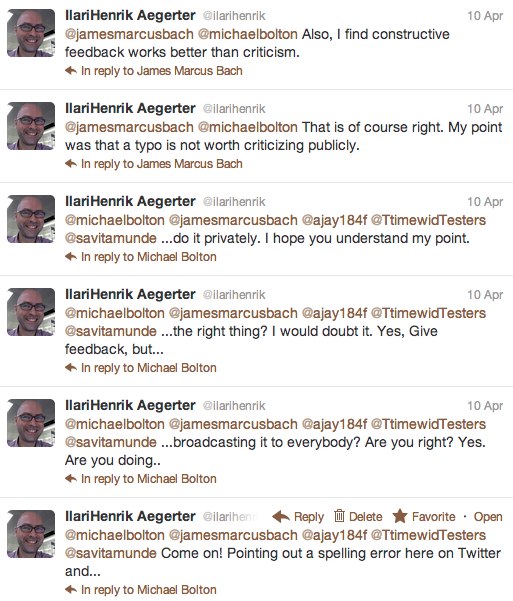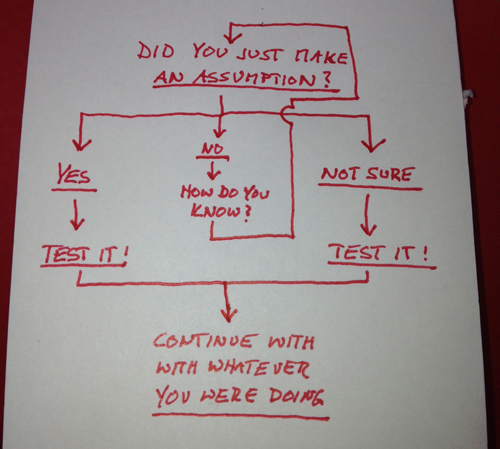April 2012
Thou Shall Test if you Catch yourself Assuming
13.04.12 - 15:00 - Filed in: Software Testing

image credit: http://j.mp/HAv17F
The best lessons to learn are the ones that happen to yourself. This week, I experienced a schoolbook example of such a thing. I was making a bunch of assumptions and didn’t care to verify them. Today, I shake my head in disbelief.
What happened?
On Monday, 9 April, Ajay wrote in a short tweet that he was disappointed with the syllabus of an online course. The course was published here:
http://www.qualitytesting.info/forum/topics/certifications-might-get-you-job-but-only-your-testing-skills-wil
and the syllabus here:
http://qualitylearning.in/software-testing-syllabus
(it has already changed to the better in the current version)
I then asked him what he meant by “disappointed”. I was also shocked because I knew that the online course was supposed to be given by Savita Munde whom I hold in high regard as a serious tester. I have been coaching Savita for some time and I just couldn’t believe what was happening.

Both James Bach and Michael Bolton followed up with their own tweets supporting Ajay. I became angry and wrote back:

Following that I had a back and forth discussion by e-mail with James Bach where I tried to defend Savita. My point was that since she is a serious tester she cannot be criticized like that. I couldn’t stop. I was angry.
Apparently my thinking was shadowed as well. All the time I did not talk to Savita directly although it was exactly what I should have done. In the meantime the syllabus was changed and when I eventually talked to Savita she told me that the syllabus was a mistake and not published by her.
Always test your own assumptions
I am glad this happened to me because it taught me again that I need to be on guard against my own assumptions.
BTW: Read also Ajay’s blog post about it. I bow to him for his deeply human and fair reaction to the whole story.
After some iterations of thinking I came up with the following decision graph. It may be of great help the next time I make an assumption. The good thing is that it is quite simple.

Has something similar happened to you? Tell me in the comments below. I am very much interested.
What you Can Do if your Brain just Refuses to Understand
04.04.12 - 18:41 - Filed in: Software Testing

image credit: http://j.mp/HcxgtA
If you don’t live in a box shielded from everything I am sure this has happened to you: You tried to understand something and your brain just doesn’t get it. This may be uncomfortable for a context-driven tester as learning new things is quite essential to being context-driven.
There is a fabulously simple solution: Just give up
Assuming that you do not see this short and easy solution as a fit for your character disposition I guess we would have to go on with a longer elaboration.
Now, a common misconception is that your brain works like a hard disk. Here data, there hard disk, file -> transfer. And voilà, you’re set. Just not so.
If you don’t get something, then the following happens: As soon as your brain gets input the synapses start to fire happily their little electrons and look for pre-existing structures to attach your new input to. But in this case there just isn’t any place to be attached to because the input is new and different and weird and difficult and doesn’t quite fit anywhere. Then your brain becomes sad. No place to go. The new input is like sand in your hands. Your brain just lets it trickle through. And lost it is, but not forever.
Give yourself time
Think hard, then sleep, then wake up and get the solution for breakfast. Our brain acts in mysterious ways. We are not general statement solvers that always evaluate an input to a correct solution right away
Go for a walk and continue thinking
There is a whole thought school on walking and thinking called Peripatetic School. It originated with every tester’s old friend - Aristotle. Follow the link and read about them.
And with walking comes fresh air and you have the liberty to choose a good discussion partner and decide on where you want to walk. Isn’t that cool?
Not only the greek liked walking and thinking, Rousseau liked it, too. He might have had the idea from the greeks, though. But who cares where something comes from if it works.
Go ahead and try it out. Solutions may come flying towards you. Then you just need to catch them."I can only meditate when I'm walking. When I stop, my mind ceases to think; my mind only works with my legs." Jean-Jacques Rousseau
Visualize
Don’t just brood over something until your brains starts boiling. Extend yourself, take your hands and draw your problem. Make it visible. Look at it. Draw again. You “see” the great feedback loop you just created?
There are different forms of thinking. You are most likely to face problem solving in a verbal fashion. You just juggle words in you head and you try to sort them. But there are other, non-verbal forms of thinking, which are:
- musical
- kinesthetic
- mathematical
- visual
Anyway, visualization may greatly help with your thinking process.
Have a whiteboard/flipchart/blackboard close to you
That would be the preferred space to visualize. Their size helps you to get your problem “in your face”. It just pushes at you until you see a path through the jungle.
Discuss with friends
Explain your problem to a friend and get him/her involved in a lively discussion. The best discussion partner would be somebody with whom you tend to disagree. They obviously understand the world differently, otherwise you wouldn’t be quarreling constantly.
Just do
How much do you really need to understand to at least start with something? As mentioned in a previous post, true mastery comes through practice. Just start with doing and understanding will follow.
Prepare a presentation and talk to people about it
Take something completely new and unintelligeble to your mind and start making a presentation. Guess what, you learn with ultra-sonic speed. The outside pressure keeps you focused.
Write down what exactly you do not understand
Again a neat little feedback loop. Writing is reading your thinking. You might want to use the Phoenix Checklist. Search on the engine of your choice and you will quite easily find it.
AND MOST IMPORTANT:
Learn to feel comfortable with not understanding
You don’t need to fully understand everything. At least not immediately. If you want that, you will always remain in your comfort zone. The comfort zone is a very dangerous area. It is the little brother of mediocrity. Who has the aspirations to be mediocre? Anybody?
A little tautology here: Difficult things are difficult. If you don’t learn to be comfortable with the slow process of understanding difficult things, you most likely will abandon your pursuit of greatness. It doesn’t just happen overnight. You need to work for it. Start today.
(And tell me in the comments below how you face your difficult understanding problems, I am very much interested in how YOU do it)